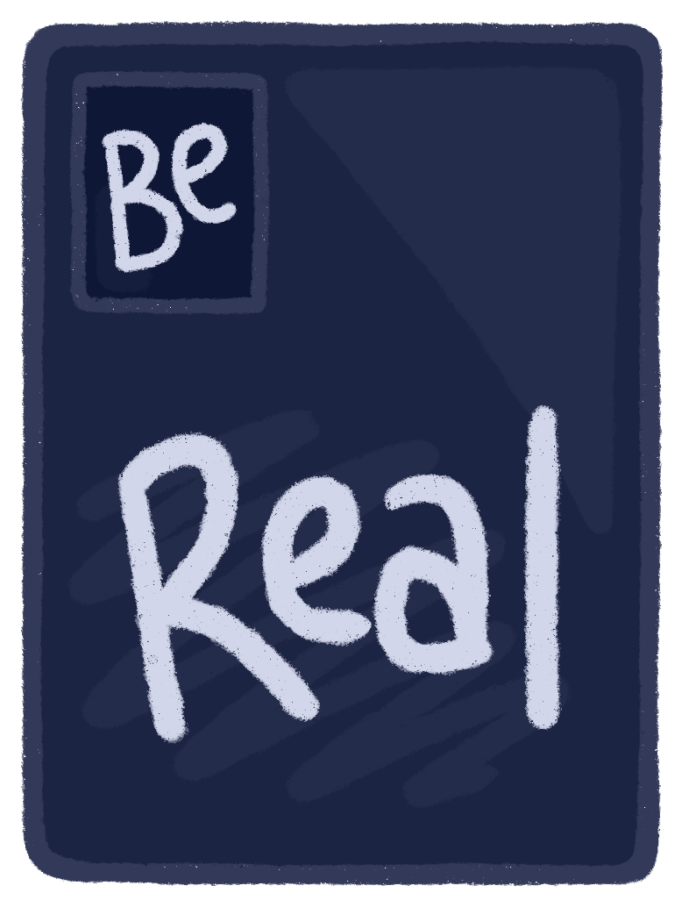BeReal: social media as it should be
BeReals are front-and-back pictures, taken daily during a random two-minute interval.
October 5, 2022
At a time when our friends and family are only a few clicks and swipes away, communication has never been so multifaceted. Students find themselves responding to text messages, group chats, personal emails, school-related emails, DMs and more; it is tough to keep up. Social media apps tie a critical component of our lives – communication – to an endless stream of content, making them troublesome and addictive time wasters. Users end up scrolling, sometimes for hours, in a fatiguing yet mesmerizing search for more interesting content. A new social media app called BeReal solves this issue once and for all.
Looking for a video feed? Filters? Followers? Likes? You won’t find any of these on BeReal. Every day, during a random two-minute interval, the app sends a notification asking users to upload their BeReal: an impromptu, front-and-back picture without any options to edit or filter the frame. For those caught up in an activity and unable to use their phones, the app allows some leeway through late BeReals, though all are timestamped. By the next day’s notification, a user’s previous BeReal will disappear for others but remain in the “Memories” tab, only available to the user.
Users can react to their friends’ BeReals, but there is a twist: they can either leave a traditional comment or upload a “RealMoji” – an emoji the user recreates. There are a few standard RealMojis, including a thumbs-up, smile, surprised face and personalized renditions of “heart-eyes” and “LOL” emojis. BeReal also includes an option to pose for an on-the-spot reaction, much like MeMojis on iMessage. Beyond that, there is little else to do besides – for those feeling immensely bored – viewing randomized public BeReals through the Discovery feed.
Most people simply are not interested in the numbing sea of photos and videos that traditional social media companies push to their users nonstop; the same goes for BeReal’s Discovery page. “Honestly, I never go on to the Discovery page. … It’s about, like, seeing what my friends are doing. I have no interest in what … random people in the world are doing,” junior Rushi Jain said. On BeReal, the feature differs from addictive Reels or TikToks by design: it does not appear to target users with relevant content and is essentially pointless to browse. “Every time I look at it, it’s a lot of people that look like they live in LA and are doing fun things all day…On Instagram and TikTok, I learn about things that are related to my family or things that I like, [but] on BeReal, it’s not worth it,” junior Kayden Siegal said.
BeReal is unique in its approach to privacy and engagement. BeReals are not like posts; they never stay on your profile page. Profiles can show as little as a name and mutual friends. Users can add and remove friends at their discretion, controlling who gets to see their photos. Others’ photos are accessible only after posting a BeReal, encouraging participation and making online interaction a fair trade. On other apps, people tend to consume content without contributing, which demoralizes users and limits social exchange. Consequently, those apps do not foster a true sense of community; BeReal’s face-to-face peer-oriented platform does. “It’s kinda fun and silly and I can see what my friends are doing at random times of the day. … I feel solidarity,” junior Daniel Chernyak said.
BeReal’s streamlined take on social media is refreshing and lessens the harm that social media inflicts on teenagers. Namely, there is no unhealthy obsession over followers and likes or posting the perfect picture, nor the anxiety that comes from responding to countless DMs, swiping through stories, or scrolling through video feeds. “It takes two minutes for each post, … plus maybe a total of another like three minutes to look at people’s BeReals,” Siegal said. BeReal ultimately saves time while motivating users to interact more genuinely online. The app’s focus on smaller, real-life friend groups also makes it inherently less stressful. “On Instagram, I’m much more like stressed about like what I’m posting because it’s also a much wider audience. BeReal, it’s like, I have … maybe like 20 people on my friends list,” Jain said. “It doesn’t have that same like intensity.” According to a study by The University of Rochester, teenagers who receive fewer likes on posts feel “more strongly rejected, and reported more negative thoughts about themselves.” Follower counts likely affect teenagers in analogous ways; BeReal sidesteps these concerns by removing these counts altogether.
That said, BeReal has some downsides. It doesn’t entirely solve the FOMO problem, the universal “fear of missing out.” Users can still post late BeReals and ultimately decide when they want to post, completely missing the point. Additionally, if users don’t post, their friends see an empty screen and may be less inclined to post themselves, slowing down the app’s momentum. While BeReal does its best to encourage today’s image-obsessed society to be more authentic, it is only as effective as its user lets it be.
BeReal is still a relatively new platform that adequately addresses several of the drawbacks of widespread social media apps. However, its impact on inherently-toxic social media culture remains unknown. According to DataReportal, 59% of the world’s population – about five billion people – are active social media users, meaning that subsequent mental health concerns are globally relevant. Widespread efforts to improve social media are underway; in the meantime, BeReal does a fantastic job of keeping things real, minimizing distractions and encouraging authenticity.



